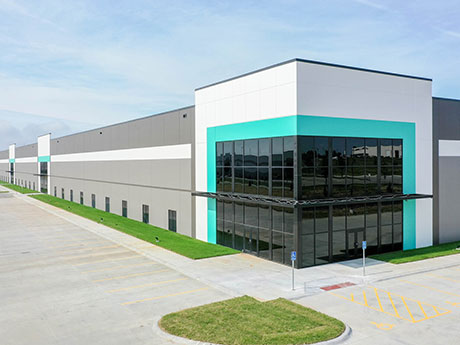Ford Storage and Moving Co., a Nebraska-based warehouse company, signed a 150,280-square-foot industrial lease at R&R Commerce Park in Omaha. R&R
Commerce Park is a four-building industrial park spanning 1.1 million square feet.
By Denny Sciscoe, The Lund Co.
The Omaha industrial market is experiencing increased leasing velocity, positive rent growth and record-breaking development. The market consists of 18 submarkets, totaling 103 million square feet of inventory.
Omaha has traditionally been a risk-averse market with steady, slow-paced growth. Since 2016, Omaha has seen increased speculative development, which is absorbed as fast as it is built. In 2020, we began to see
hyper-development, fueled by increased demand and developer confidence. The increased demand was a result of COVID-19, where we experienced five years of growth in a 12-month period as occupiers scrambled to find space for inventories and e-commerce, which was exasperated by the demand to store “just in case” inventories.
The supply and demand dynamics of our market have been almost perfectly balanced. The average deliveries are around 1.3 million square feet annually, and our average absorption has been around 1.4 million square feet.
Since the beginning of 2022, we are tracking about 5 million square feet of demand and another 2.2 million square feet of space that is currently in the construction pipeline. Overall vacancy currently sits at 2.6 percent, which is 100 basis points below our average of 3.6 percent.
Rents were increasing around 4 percent annually from 2016 to 2020 and have doubled to 8 percent growth from 2021 to present. During the same period, speculative development increased by approximately 270 percent annually, while the size of the developments increased by 40 percent. The average rent across all industrial property types is $7.16 per square foot, which is about 33 percent less than the national average.
The speculative developer pool is growing with local, regional and institutional developers. The local developers include White Lotus, The Meyers Family, Century Development, Greenslate and NewStreet. The regional and institutional developers include The Opus Group, Ryan Cos., Scannell Properties and R&R Realty Group.
There are other regional and institutional developers that are working to acquire land, but ready-to-develop land acquisition is challenging. Of the 2.2 million square feet of speculative development under construction, 25 percent is preleased. The developments are pushing outward and expanding our market footprint.
NewStreet is developing our first speculative cross-dock facility, consisting of 400,000 square feet, with room for up to 2 million square feet in Gretna.
Opus is developing 550,000 square feet in Council Bluffs, Iowa, which is the first speculative development in Council Bluffs of this significance. The Opus development was 30 percent preleased before construction commenced.
White Lotus has developed 140 acres in Papillion totaling 806,000 square feet and is 70 percent leased with room to expand another 100,000 square feet. This development includes high-profile occupiers like Amazon, GXO, UPS, Home Depot and Scooters.
R&R has developed approximately 1 million square feet at R&R Commerce Park, which is fully leased and is home to Walmart, Van Meter, Ford Storage, XPO and Mission Foods. R&R has started on its second development, R&R Commerce Park South. The firm is currently building about 500,000 square feet, which is already 15 percent leased during construction.
The Meyers Family has developed a 170,000-square-foot build-to-suit property for US Auto Force, with plans to develop the remaining ground.
Century Development and Greenslate are pioneering developing into the Northeast industrial submarket where tax-increment financing (TIF) is available with access to labor and Eppley Airfield.
Scannell has developed a last-mile facility for Amazon and a 350,000-square-foot FedEx facility.
Ryan Cos. has developed a 2.7 million-square-foot Amazon distribution center, which is the largest industrial building in our market. Ryan also developed a last-mile facility and a 350,000-square-foot distribution center for Amazon.
Limited infrastructure, supply chain constraints and rising construction costs is making development more challenging. There is a lot of land available but not having proper infrastructure, mainly utilities (sewer), have constrained development potential. A sewer agency has been formed and is making progress on opening up development land in Sarpy County. Supply chain constraints are softening but developers and tenants are still seeing project timelines extended.
The forecast for our industrial market remains bullish. Tenant demand and low vacancy rates will continue to drive development velocity and increase rental rates. Omaha is a conservative development market that has seldom got ahead of its skis. Omaha is in a good position to weather any headwinds that may be coming, and the market is expected to see steady growth into the foreseeable future.
Denny Sciscoe is director of industrial services with The Lund Co. This article originally appeared in the October 2022 issue of Heartland Real Estate Business magazine.
This article is first published on Source link







